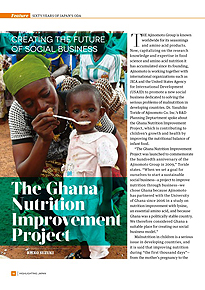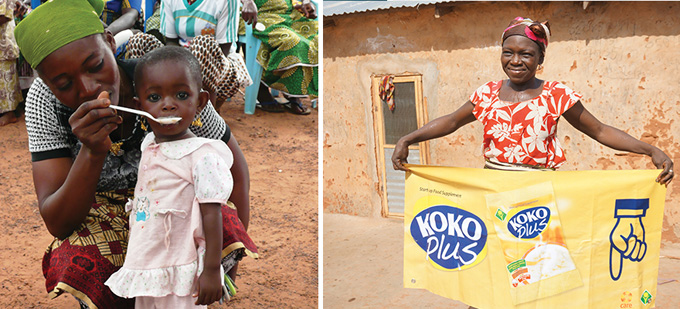Home > Highlighting JAPAN >Highlighting Japan August 2014>Sixty Years of Japan's ODA
Highlighting JAPAN

Sixty Years of Japan's ODA
Creating the Future of Social Business
The Ghana Nutrition Improvement Project

The Ajinomoto Group is known worldwide for its seasonings and amino acid products. Now, capitalizing on the research knowledge and expertise in food science and amino acid nutrition it has accumulated since its founding, Ajinomoto is working together with international organizations such as JICA and the United States Agency for International Development (USAID) to promote a new social business dedicated to solving the serious problems of malnutrition in developing countries. Dr. Yasuhiko Toride of Ajinomoto Co. Inc.'s R&D Planning Deptartment spoke about the Ghana Nutrition Improvement Project, which is contributing to children's growth and health by improving the nutritional balance of infant food.
"The Ghana Nutrition Improvement Project was launched to commemorate the hundredth anniversary of the Ajinomoto Group in 2009," Toride states. "When we set a goal for ourselves to start a sustainable social business—a project to improve nutrition through business—we chose Ghana because Ajinomoto has partnered with the University of Ghana since 2006 in a study on nutrition improvement with lysine, an essential amino acid, and because Ghana was a politically stable country. We therefore considered Ghana a suitable place for creating our social business model."
Malnutrition in children is a serious issue in developing countries, and it is said that improving nutrition during "the first thousand days"—from the mother's pregnancy to the child's second birthday—is of utmost importance. Malnutrition during this period can retard the development of both the body and the brain, its negative impact being irreversible.
"Koko, Ghana's traditional infant food, is a sour porridge made of fermented corn. Infant food is given to babies from six months of age, and koko is the most common infant food for Ghanaian children," says Toride. "Koko alone, however, does not provide the amounts of protein and micronutrients necessary for the growth of children."
"That's why we developed KOKO Plus, which fortifies the amount of each necessary nutrient using locally available soybeans as a main ingredient," Toride continues. "Local people add sugar to koko for a sweet-and-sour taste, but instead we have them add KOKO Plus, which contains the appropriate amount of nutrients as well as a proper level of sugar. We made a thorough study of taste preferences and ultimately created a product that local people tell us is delicious."
Enthusiastic feedback has come from mothers in impoverished regions where KOKO Plus is being sold on a trial basis. They say they have seen dramatic improvements in their children's health in a short time. The product's full-fledged launch, scheduled for spring 2015, was also met with a positive response.
"Creating demand for food products like KOKO Plus that improve nutrition is not easy, because in addition to factors associated with ordinary food products such as taste and food safety, building consumer awareness on the importance of nutrition is essential. To conduct nutrition education effectively in rural communities, it is important to collaborate with Ghana's local governments, international development agencies as well as international NGOs," says Toride. "Because the objective of our Nutrition Improvement Project through social business is to solve the problem of malnutrition, emphasizing the importance of nutrition improvement in the first thousand days, we were able to receive needed cooperation from a wide range of partners, including the Ghanaian Ministry of Health, JICA and USAID."
In social businesses, partnerships can create a win-win situation. For example, partnerships with local companies and manufacturing the product using local ingredients creates jobs. Partnerships with international NGOs in creating a distribution system with the network of women for door-to-door sales will help women in rural villages. Partnerships with government health agencies and NGOs promote awareness on the importance of nutrition among village people. Partnerships are essential for the success of social businesses.
"Simply providing money and human resources doesn't work well for development assistance in the long term," Toride explains. "We believe that creating a win-win situation among all stakeholders, including local people, by establishing a sustainable social business is an effective approach. Creating social businesses will be possible only by accumulating various know-how and expertise of all stakeholders through partnerships. Through the Ghana Nutrition Improvement Project, we want to create a successful social business model that can be expanded and replicated throughout the world."
© 2009 Cabinet Office, Government of Japan






